Self-Management Strategy Report: Self-Awareness and Leadership Skills
VerifiedAdded on 2022/10/18
|14
|3311
|186
Report
AI Summary
This report delves into a comprehensive self-management strategy, analyzing the author's self-awareness through the lens of personality (Big Five model), values, and emotional intelligence. It explores leadership aspirations and abilities, power dynamics, and political skills. The report then examines decision-making theories, including rational and behavioral approaches, providing a framework for personal and professional development. The author discusses their values of commitment, loyalty, and reliability, along with motivators like accomplishment and curiosity. The analysis extends to emotional intelligence, leadership aspirations, and the use of power and influence. Finally, the report concludes with a discussion on decision-making theories and their application to problem-solving, offering insights into self-improvement and career advancement.
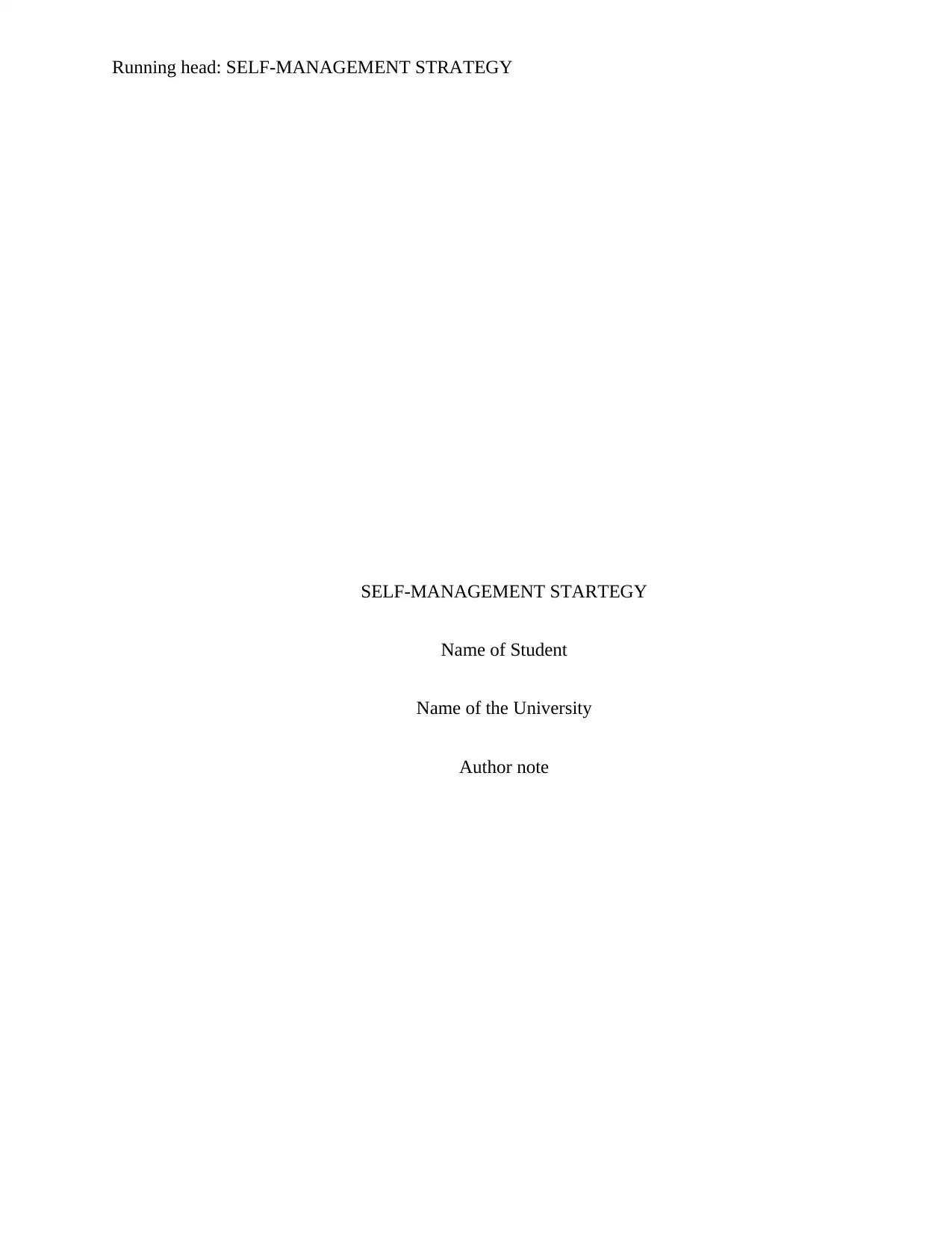
Running head: SELF-MANAGEMENT STRATEGY
SELF-MANAGEMENT STARTEGY
Name of Student
Name of the University
Author note
SELF-MANAGEMENT STARTEGY
Name of Student
Name of the University
Author note
Paraphrase This Document
Need a fresh take? Get an instant paraphrase of this document with our AI Paraphraser
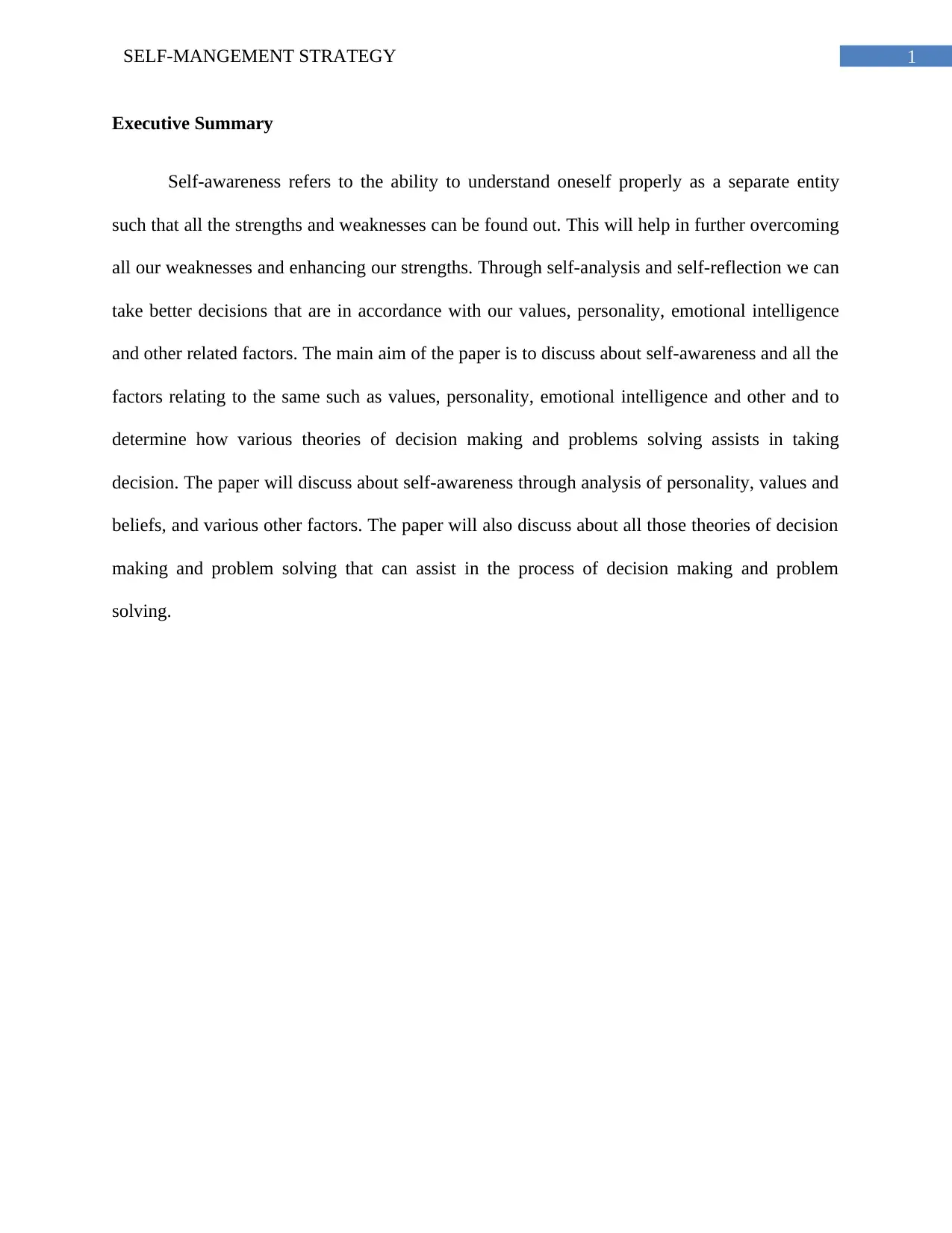
1SELF-MANGEMENT STRATEGY
Executive Summary
Self-awareness refers to the ability to understand oneself properly as a separate entity
such that all the strengths and weaknesses can be found out. This will help in further overcoming
all our weaknesses and enhancing our strengths. Through self-analysis and self-reflection we can
take better decisions that are in accordance with our values, personality, emotional intelligence
and other related factors. The main aim of the paper is to discuss about self-awareness and all the
factors relating to the same such as values, personality, emotional intelligence and other and to
determine how various theories of decision making and problems solving assists in taking
decision. The paper will discuss about self-awareness through analysis of personality, values and
beliefs, and various other factors. The paper will also discuss about all those theories of decision
making and problem solving that can assist in the process of decision making and problem
solving.
Executive Summary
Self-awareness refers to the ability to understand oneself properly as a separate entity
such that all the strengths and weaknesses can be found out. This will help in further overcoming
all our weaknesses and enhancing our strengths. Through self-analysis and self-reflection we can
take better decisions that are in accordance with our values, personality, emotional intelligence
and other related factors. The main aim of the paper is to discuss about self-awareness and all the
factors relating to the same such as values, personality, emotional intelligence and other and to
determine how various theories of decision making and problems solving assists in taking
decision. The paper will discuss about self-awareness through analysis of personality, values and
beliefs, and various other factors. The paper will also discuss about all those theories of decision
making and problem solving that can assist in the process of decision making and problem
solving.
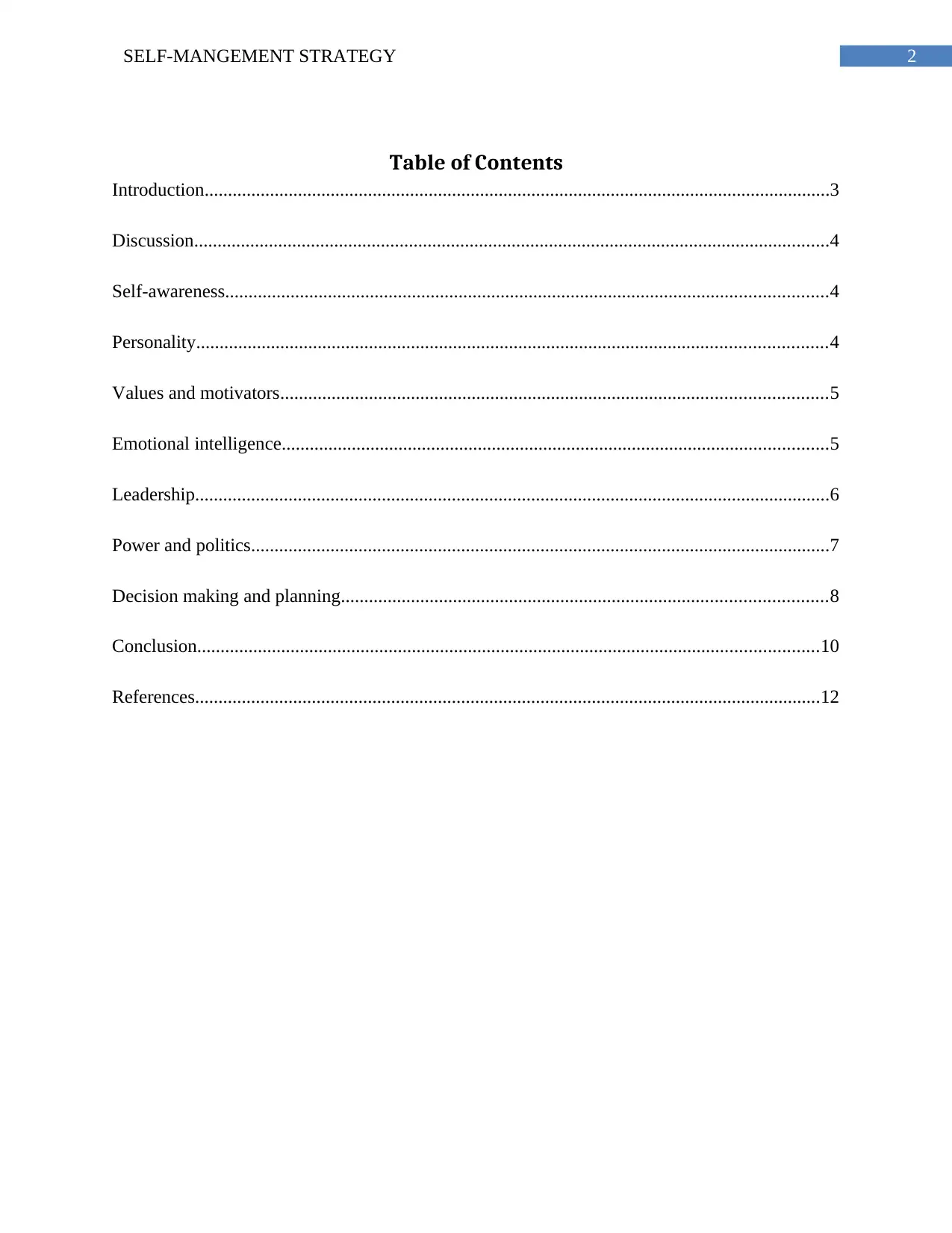
2SELF-MANGEMENT STRATEGY
Table of Contents
Introduction......................................................................................................................................3
Discussion........................................................................................................................................4
Self-awareness.................................................................................................................................4
Personality.......................................................................................................................................4
Values and motivators.....................................................................................................................5
Emotional intelligence.....................................................................................................................5
Leadership........................................................................................................................................6
Power and politics............................................................................................................................7
Decision making and planning........................................................................................................8
Conclusion.....................................................................................................................................10
References......................................................................................................................................12
Table of Contents
Introduction......................................................................................................................................3
Discussion........................................................................................................................................4
Self-awareness.................................................................................................................................4
Personality.......................................................................................................................................4
Values and motivators.....................................................................................................................5
Emotional intelligence.....................................................................................................................5
Leadership........................................................................................................................................6
Power and politics............................................................................................................................7
Decision making and planning........................................................................................................8
Conclusion.....................................................................................................................................10
References......................................................................................................................................12
⊘ This is a preview!⊘
Do you want full access?
Subscribe today to unlock all pages.

Trusted by 1+ million students worldwide
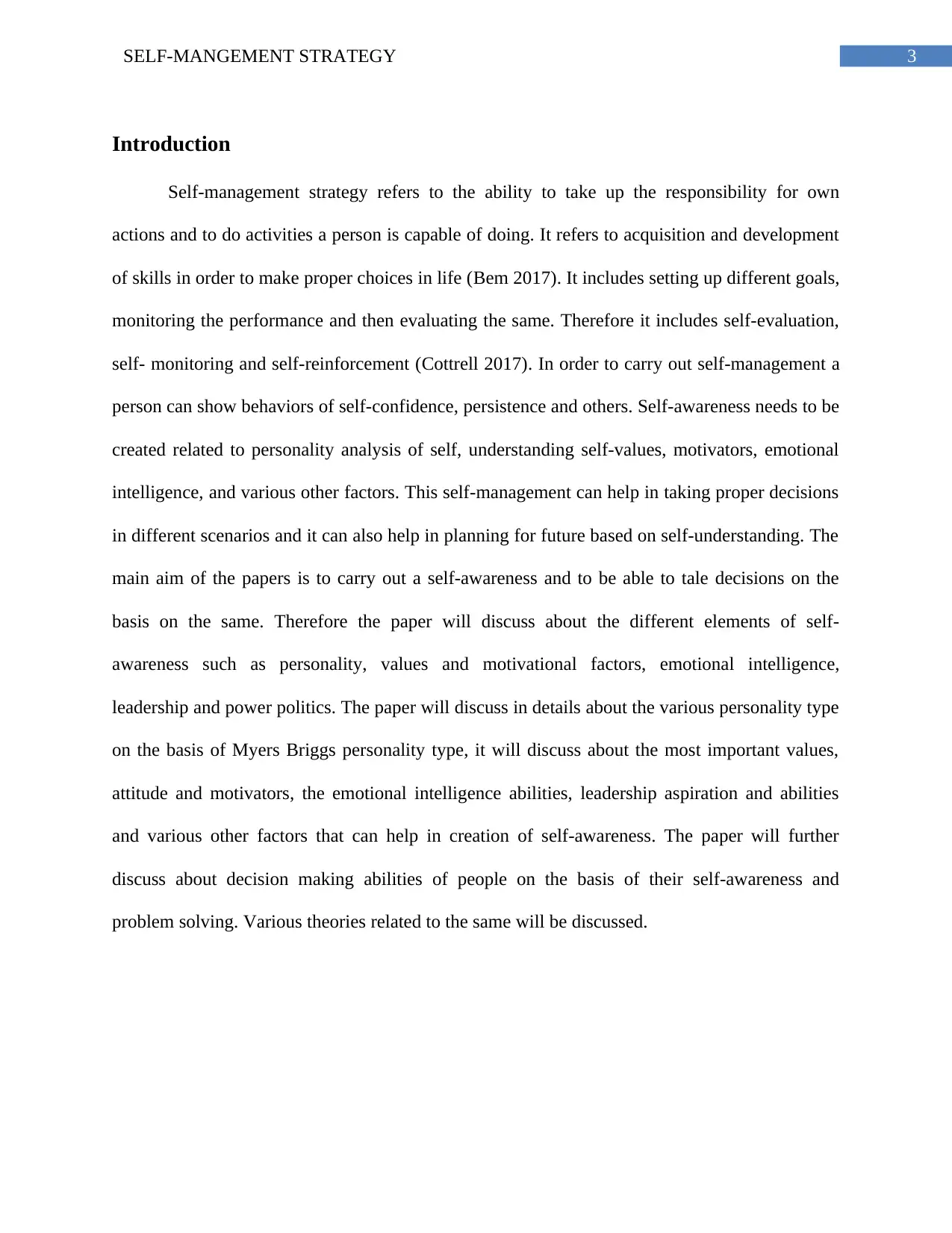
3SELF-MANGEMENT STRATEGY
Introduction
Self-management strategy refers to the ability to take up the responsibility for own
actions and to do activities a person is capable of doing. It refers to acquisition and development
of skills in order to make proper choices in life (Bem 2017). It includes setting up different goals,
monitoring the performance and then evaluating the same. Therefore it includes self-evaluation,
self- monitoring and self-reinforcement (Cottrell 2017). In order to carry out self-management a
person can show behaviors of self-confidence, persistence and others. Self-awareness needs to be
created related to personality analysis of self, understanding self-values, motivators, emotional
intelligence, and various other factors. This self-management can help in taking proper decisions
in different scenarios and it can also help in planning for future based on self-understanding. The
main aim of the papers is to carry out a self-awareness and to be able to tale decisions on the
basis on the same. Therefore the paper will discuss about the different elements of self-
awareness such as personality, values and motivational factors, emotional intelligence,
leadership and power politics. The paper will discuss in details about the various personality type
on the basis of Myers Briggs personality type, it will discuss about the most important values,
attitude and motivators, the emotional intelligence abilities, leadership aspiration and abilities
and various other factors that can help in creation of self-awareness. The paper will further
discuss about decision making abilities of people on the basis of their self-awareness and
problem solving. Various theories related to the same will be discussed.
Introduction
Self-management strategy refers to the ability to take up the responsibility for own
actions and to do activities a person is capable of doing. It refers to acquisition and development
of skills in order to make proper choices in life (Bem 2017). It includes setting up different goals,
monitoring the performance and then evaluating the same. Therefore it includes self-evaluation,
self- monitoring and self-reinforcement (Cottrell 2017). In order to carry out self-management a
person can show behaviors of self-confidence, persistence and others. Self-awareness needs to be
created related to personality analysis of self, understanding self-values, motivators, emotional
intelligence, and various other factors. This self-management can help in taking proper decisions
in different scenarios and it can also help in planning for future based on self-understanding. The
main aim of the papers is to carry out a self-awareness and to be able to tale decisions on the
basis on the same. Therefore the paper will discuss about the different elements of self-
awareness such as personality, values and motivational factors, emotional intelligence,
leadership and power politics. The paper will discuss in details about the various personality type
on the basis of Myers Briggs personality type, it will discuss about the most important values,
attitude and motivators, the emotional intelligence abilities, leadership aspiration and abilities
and various other factors that can help in creation of self-awareness. The paper will further
discuss about decision making abilities of people on the basis of their self-awareness and
problem solving. Various theories related to the same will be discussed.
Paraphrase This Document
Need a fresh take? Get an instant paraphrase of this document with our AI Paraphraser
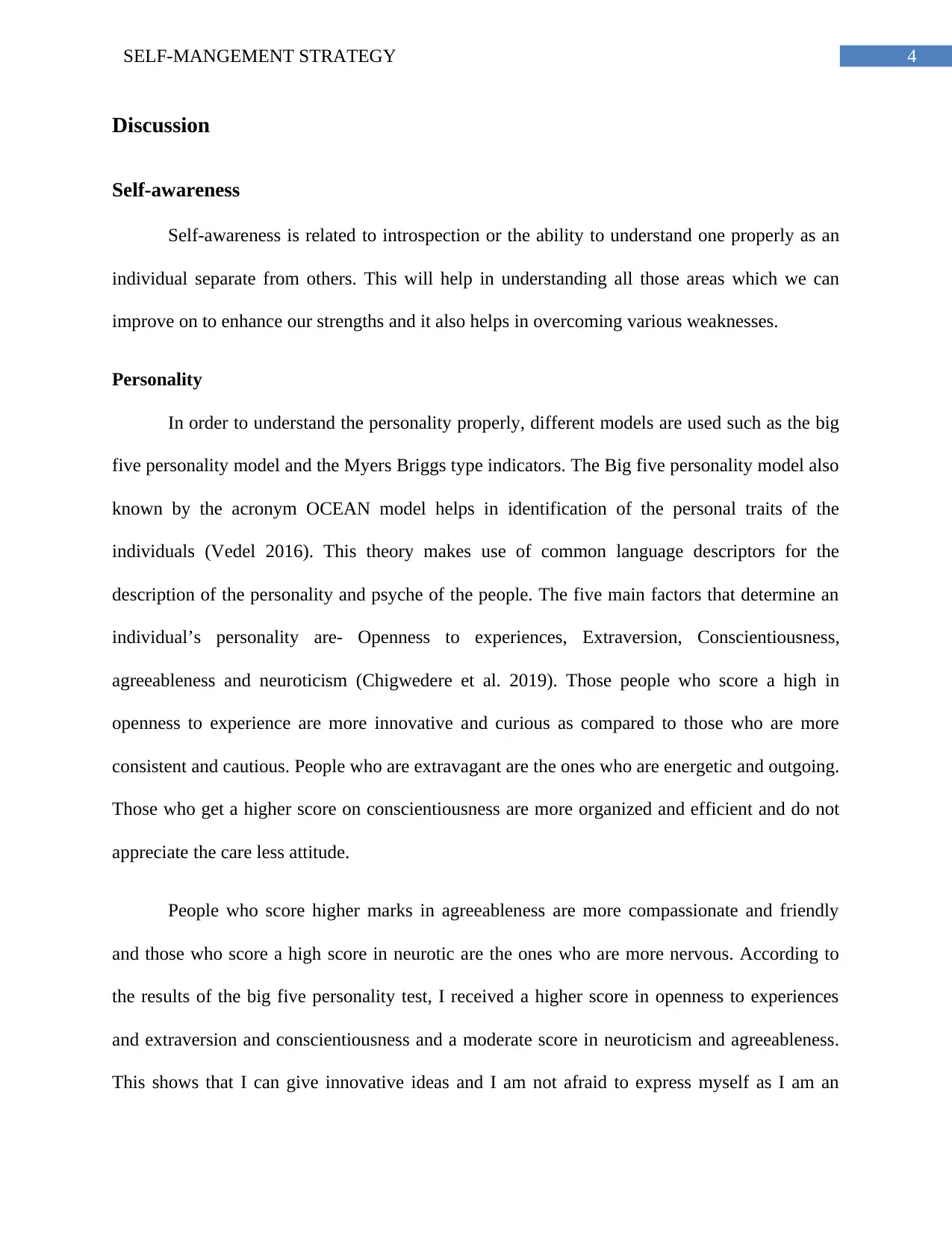
4SELF-MANGEMENT STRATEGY
Discussion
Self-awareness
Self-awareness is related to introspection or the ability to understand one properly as an
individual separate from others. This will help in understanding all those areas which we can
improve on to enhance our strengths and it also helps in overcoming various weaknesses.
Personality
In order to understand the personality properly, different models are used such as the big
five personality model and the Myers Briggs type indicators. The Big five personality model also
known by the acronym OCEAN model helps in identification of the personal traits of the
individuals (Vedel 2016). This theory makes use of common language descriptors for the
description of the personality and psyche of the people. The five main factors that determine an
individual’s personality are- Openness to experiences, Extraversion, Conscientiousness,
agreeableness and neuroticism (Chigwedere et al. 2019). Those people who score a high in
openness to experience are more innovative and curious as compared to those who are more
consistent and cautious. People who are extravagant are the ones who are energetic and outgoing.
Those who get a higher score on conscientiousness are more organized and efficient and do not
appreciate the care less attitude.
People who score higher marks in agreeableness are more compassionate and friendly
and those who score a high score in neurotic are the ones who are more nervous. According to
the results of the big five personality test, I received a higher score in openness to experiences
and extraversion and conscientiousness and a moderate score in neuroticism and agreeableness.
This shows that I can give innovative ideas and I am not afraid to express myself as I am an
Discussion
Self-awareness
Self-awareness is related to introspection or the ability to understand one properly as an
individual separate from others. This will help in understanding all those areas which we can
improve on to enhance our strengths and it also helps in overcoming various weaknesses.
Personality
In order to understand the personality properly, different models are used such as the big
five personality model and the Myers Briggs type indicators. The Big five personality model also
known by the acronym OCEAN model helps in identification of the personal traits of the
individuals (Vedel 2016). This theory makes use of common language descriptors for the
description of the personality and psyche of the people. The five main factors that determine an
individual’s personality are- Openness to experiences, Extraversion, Conscientiousness,
agreeableness and neuroticism (Chigwedere et al. 2019). Those people who score a high in
openness to experience are more innovative and curious as compared to those who are more
consistent and cautious. People who are extravagant are the ones who are energetic and outgoing.
Those who get a higher score on conscientiousness are more organized and efficient and do not
appreciate the care less attitude.
People who score higher marks in agreeableness are more compassionate and friendly
and those who score a high score in neurotic are the ones who are more nervous. According to
the results of the big five personality test, I received a higher score in openness to experiences
and extraversion and conscientiousness and a moderate score in neuroticism and agreeableness.
This shows that I can give innovative ideas and I am not afraid to express myself as I am an
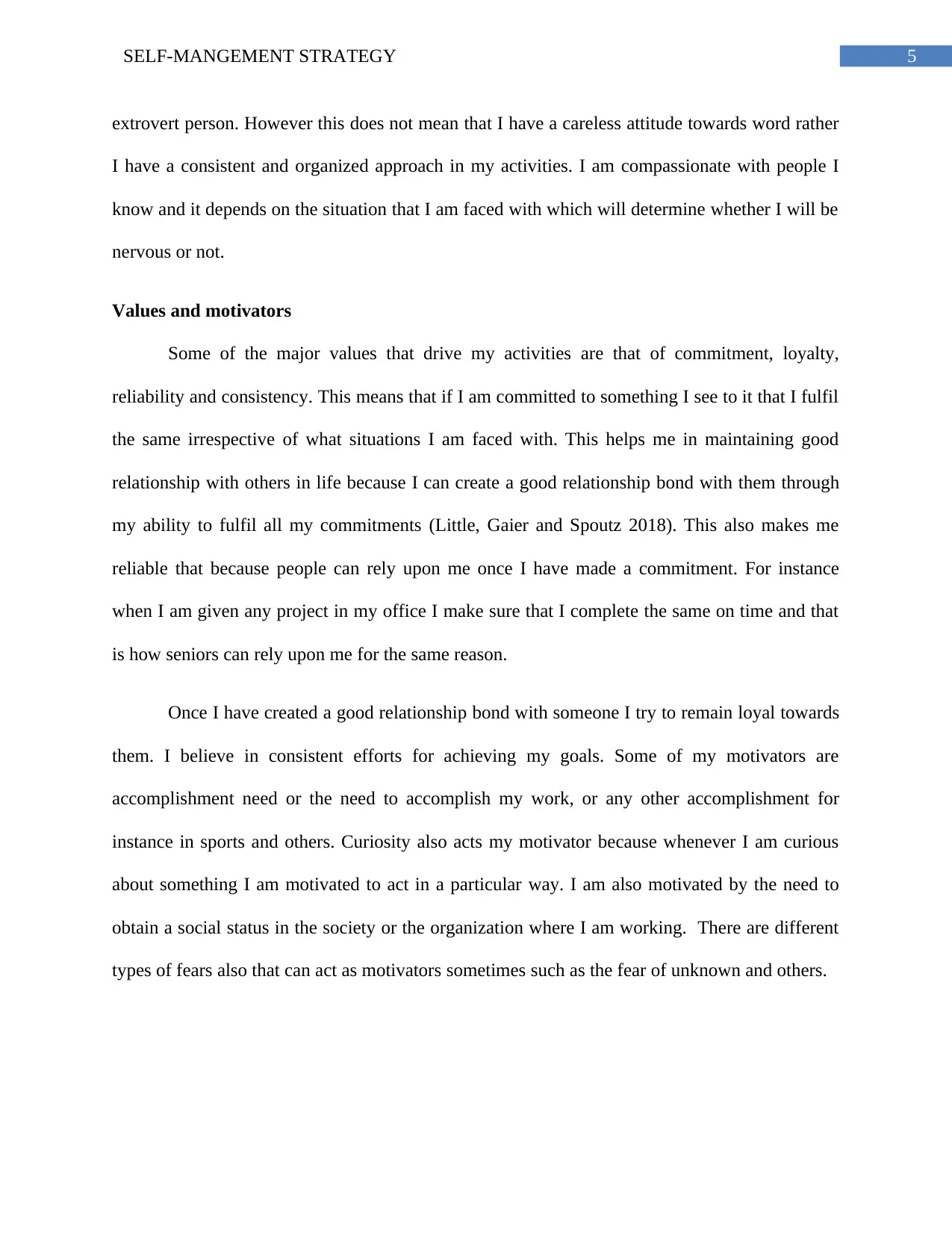
5SELF-MANGEMENT STRATEGY
extrovert person. However this does not mean that I have a careless attitude towards word rather
I have a consistent and organized approach in my activities. I am compassionate with people I
know and it depends on the situation that I am faced with which will determine whether I will be
nervous or not.
Values and motivators
Some of the major values that drive my activities are that of commitment, loyalty,
reliability and consistency. This means that if I am committed to something I see to it that I fulfil
the same irrespective of what situations I am faced with. This helps me in maintaining good
relationship with others in life because I can create a good relationship bond with them through
my ability to fulfil all my commitments (Little, Gaier and Spoutz 2018). This also makes me
reliable that because people can rely upon me once I have made a commitment. For instance
when I am given any project in my office I make sure that I complete the same on time and that
is how seniors can rely upon me for the same reason.
Once I have created a good relationship bond with someone I try to remain loyal towards
them. I believe in consistent efforts for achieving my goals. Some of my motivators are
accomplishment need or the need to accomplish my work, or any other accomplishment for
instance in sports and others. Curiosity also acts my motivator because whenever I am curious
about something I am motivated to act in a particular way. I am also motivated by the need to
obtain a social status in the society or the organization where I am working. There are different
types of fears also that can act as motivators sometimes such as the fear of unknown and others.
extrovert person. However this does not mean that I have a careless attitude towards word rather
I have a consistent and organized approach in my activities. I am compassionate with people I
know and it depends on the situation that I am faced with which will determine whether I will be
nervous or not.
Values and motivators
Some of the major values that drive my activities are that of commitment, loyalty,
reliability and consistency. This means that if I am committed to something I see to it that I fulfil
the same irrespective of what situations I am faced with. This helps me in maintaining good
relationship with others in life because I can create a good relationship bond with them through
my ability to fulfil all my commitments (Little, Gaier and Spoutz 2018). This also makes me
reliable that because people can rely upon me once I have made a commitment. For instance
when I am given any project in my office I make sure that I complete the same on time and that
is how seniors can rely upon me for the same reason.
Once I have created a good relationship bond with someone I try to remain loyal towards
them. I believe in consistent efforts for achieving my goals. Some of my motivators are
accomplishment need or the need to accomplish my work, or any other accomplishment for
instance in sports and others. Curiosity also acts my motivator because whenever I am curious
about something I am motivated to act in a particular way. I am also motivated by the need to
obtain a social status in the society or the organization where I am working. There are different
types of fears also that can act as motivators sometimes such as the fear of unknown and others.
⊘ This is a preview!⊘
Do you want full access?
Subscribe today to unlock all pages.

Trusted by 1+ million students worldwide
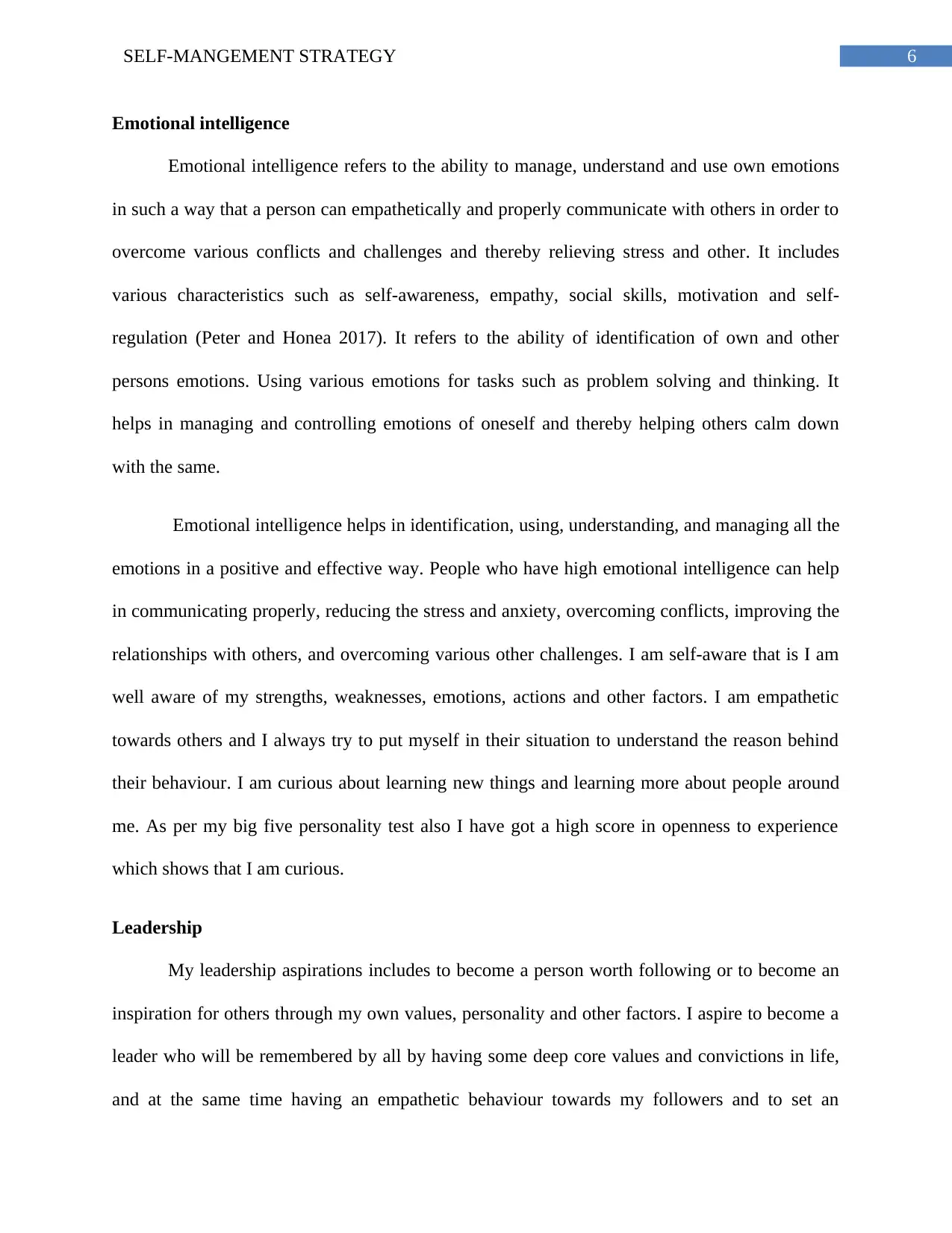
6SELF-MANGEMENT STRATEGY
Emotional intelligence
Emotional intelligence refers to the ability to manage, understand and use own emotions
in such a way that a person can empathetically and properly communicate with others in order to
overcome various conflicts and challenges and thereby relieving stress and other. It includes
various characteristics such as self-awareness, empathy, social skills, motivation and self-
regulation (Peter and Honea 2017). It refers to the ability of identification of own and other
persons emotions. Using various emotions for tasks such as problem solving and thinking. It
helps in managing and controlling emotions of oneself and thereby helping others calm down
with the same.
Emotional intelligence helps in identification, using, understanding, and managing all the
emotions in a positive and effective way. People who have high emotional intelligence can help
in communicating properly, reducing the stress and anxiety, overcoming conflicts, improving the
relationships with others, and overcoming various other challenges. I am self-aware that is I am
well aware of my strengths, weaknesses, emotions, actions and other factors. I am empathetic
towards others and I always try to put myself in their situation to understand the reason behind
their behaviour. I am curious about learning new things and learning more about people around
me. As per my big five personality test also I have got a high score in openness to experience
which shows that I am curious.
Leadership
My leadership aspirations includes to become a person worth following or to become an
inspiration for others through my own values, personality and other factors. I aspire to become a
leader who will be remembered by all by having some deep core values and convictions in life,
and at the same time having an empathetic behaviour towards my followers and to set an
Emotional intelligence
Emotional intelligence refers to the ability to manage, understand and use own emotions
in such a way that a person can empathetically and properly communicate with others in order to
overcome various conflicts and challenges and thereby relieving stress and other. It includes
various characteristics such as self-awareness, empathy, social skills, motivation and self-
regulation (Peter and Honea 2017). It refers to the ability of identification of own and other
persons emotions. Using various emotions for tasks such as problem solving and thinking. It
helps in managing and controlling emotions of oneself and thereby helping others calm down
with the same.
Emotional intelligence helps in identification, using, understanding, and managing all the
emotions in a positive and effective way. People who have high emotional intelligence can help
in communicating properly, reducing the stress and anxiety, overcoming conflicts, improving the
relationships with others, and overcoming various other challenges. I am self-aware that is I am
well aware of my strengths, weaknesses, emotions, actions and other factors. I am empathetic
towards others and I always try to put myself in their situation to understand the reason behind
their behaviour. I am curious about learning new things and learning more about people around
me. As per my big five personality test also I have got a high score in openness to experience
which shows that I am curious.
Leadership
My leadership aspirations includes to become a person worth following or to become an
inspiration for others through my own values, personality and other factors. I aspire to become a
leader who will be remembered by all by having some deep core values and convictions in life,
and at the same time having an empathetic behaviour towards my followers and to set an
Paraphrase This Document
Need a fresh take? Get an instant paraphrase of this document with our AI Paraphraser
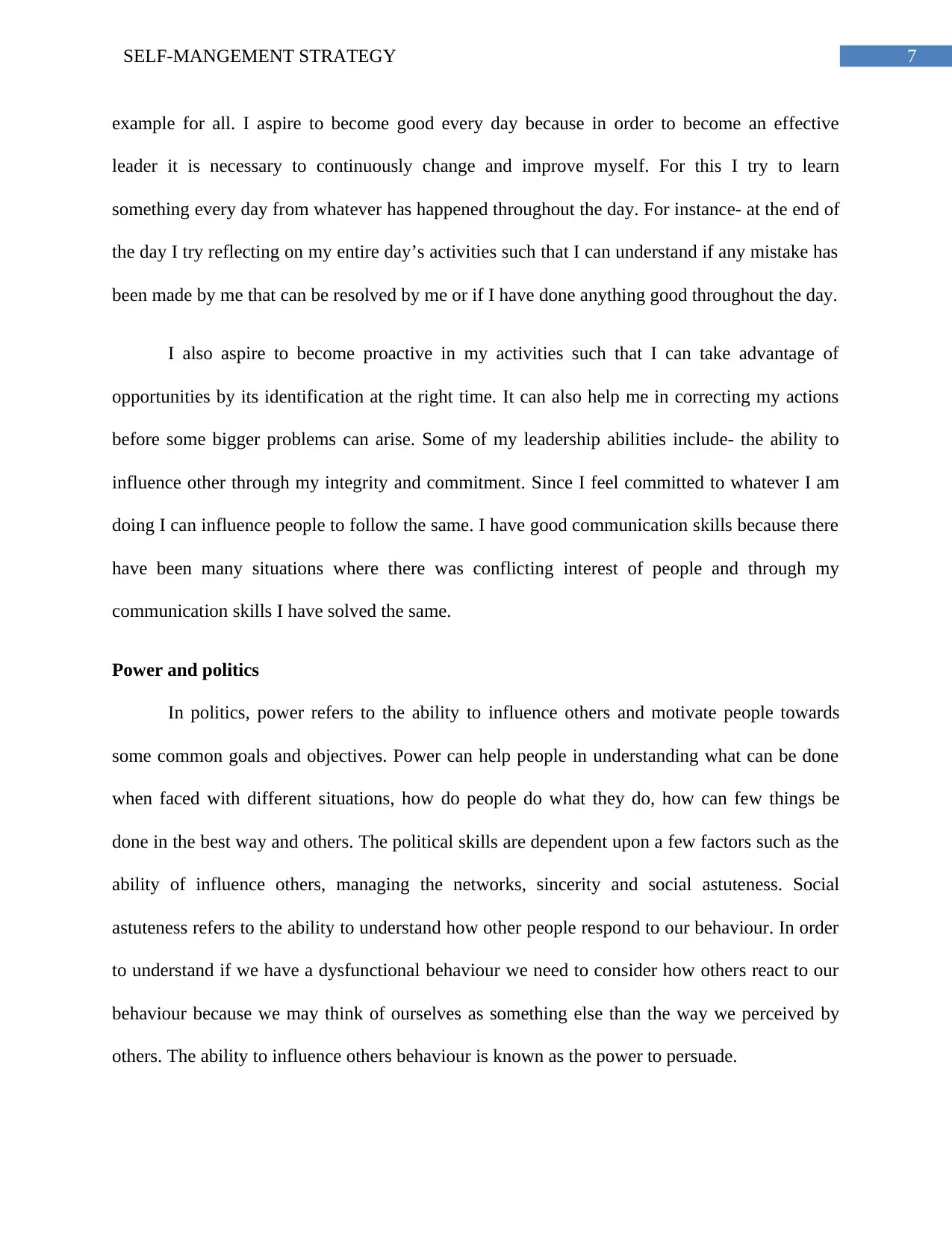
7SELF-MANGEMENT STRATEGY
example for all. I aspire to become good every day because in order to become an effective
leader it is necessary to continuously change and improve myself. For this I try to learn
something every day from whatever has happened throughout the day. For instance- at the end of
the day I try reflecting on my entire day’s activities such that I can understand if any mistake has
been made by me that can be resolved by me or if I have done anything good throughout the day.
I also aspire to become proactive in my activities such that I can take advantage of
opportunities by its identification at the right time. It can also help me in correcting my actions
before some bigger problems can arise. Some of my leadership abilities include- the ability to
influence other through my integrity and commitment. Since I feel committed to whatever I am
doing I can influence people to follow the same. I have good communication skills because there
have been many situations where there was conflicting interest of people and through my
communication skills I have solved the same.
Power and politics
In politics, power refers to the ability to influence others and motivate people towards
some common goals and objectives. Power can help people in understanding what can be done
when faced with different situations, how do people do what they do, how can few things be
done in the best way and others. The political skills are dependent upon a few factors such as the
ability of influence others, managing the networks, sincerity and social astuteness. Social
astuteness refers to the ability to understand how other people respond to our behaviour. In order
to understand if we have a dysfunctional behaviour we need to consider how others react to our
behaviour because we may think of ourselves as something else than the way we perceived by
others. The ability to influence others behaviour is known as the power to persuade.
example for all. I aspire to become good every day because in order to become an effective
leader it is necessary to continuously change and improve myself. For this I try to learn
something every day from whatever has happened throughout the day. For instance- at the end of
the day I try reflecting on my entire day’s activities such that I can understand if any mistake has
been made by me that can be resolved by me or if I have done anything good throughout the day.
I also aspire to become proactive in my activities such that I can take advantage of
opportunities by its identification at the right time. It can also help me in correcting my actions
before some bigger problems can arise. Some of my leadership abilities include- the ability to
influence other through my integrity and commitment. Since I feel committed to whatever I am
doing I can influence people to follow the same. I have good communication skills because there
have been many situations where there was conflicting interest of people and through my
communication skills I have solved the same.
Power and politics
In politics, power refers to the ability to influence others and motivate people towards
some common goals and objectives. Power can help people in understanding what can be done
when faced with different situations, how do people do what they do, how can few things be
done in the best way and others. The political skills are dependent upon a few factors such as the
ability of influence others, managing the networks, sincerity and social astuteness. Social
astuteness refers to the ability to understand how other people respond to our behaviour. In order
to understand if we have a dysfunctional behaviour we need to consider how others react to our
behaviour because we may think of ourselves as something else than the way we perceived by
others. The ability to influence others behaviour is known as the power to persuade.
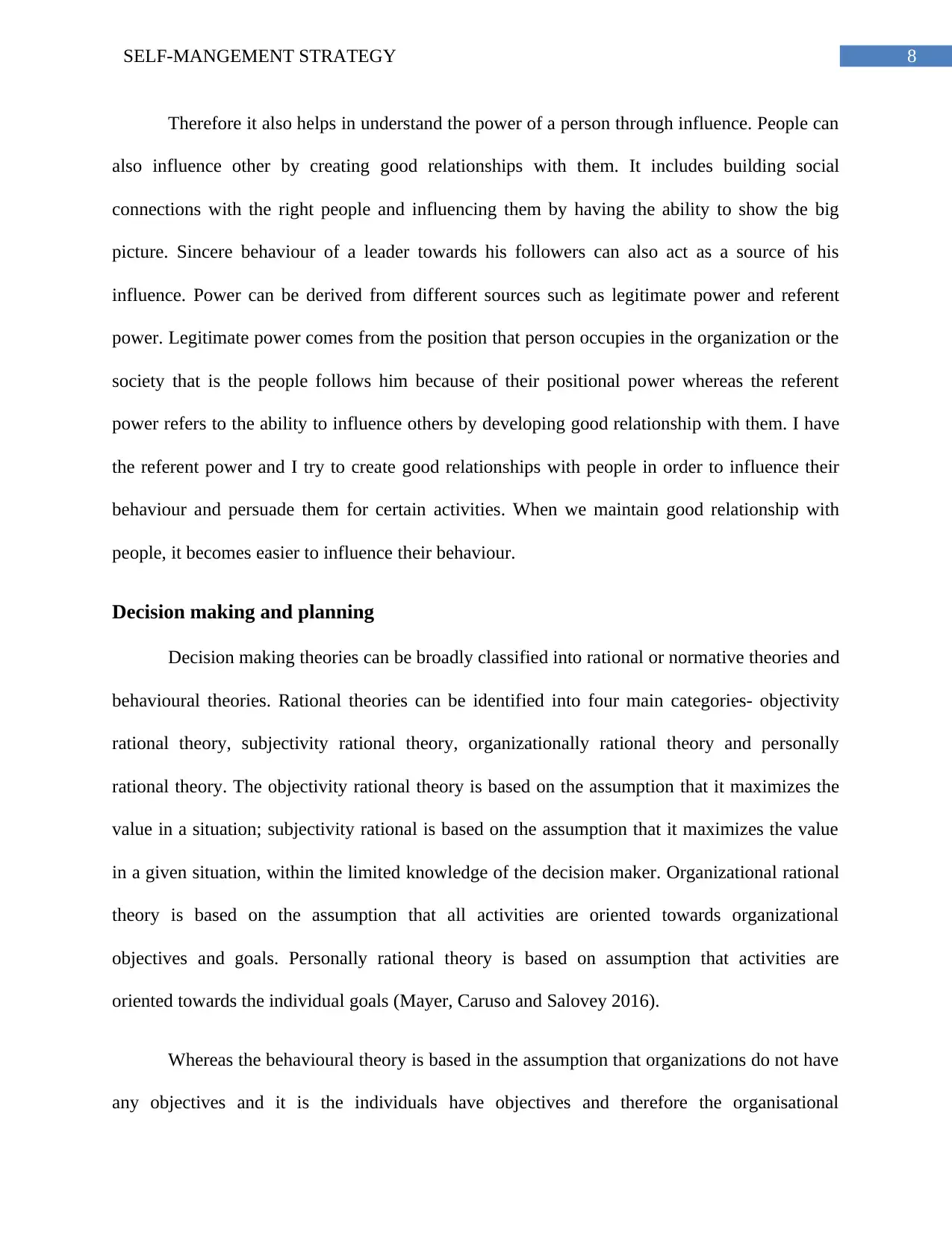
8SELF-MANGEMENT STRATEGY
Therefore it also helps in understand the power of a person through influence. People can
also influence other by creating good relationships with them. It includes building social
connections with the right people and influencing them by having the ability to show the big
picture. Sincere behaviour of a leader towards his followers can also act as a source of his
influence. Power can be derived from different sources such as legitimate power and referent
power. Legitimate power comes from the position that person occupies in the organization or the
society that is the people follows him because of their positional power whereas the referent
power refers to the ability to influence others by developing good relationship with them. I have
the referent power and I try to create good relationships with people in order to influence their
behaviour and persuade them for certain activities. When we maintain good relationship with
people, it becomes easier to influence their behaviour.
Decision making and planning
Decision making theories can be broadly classified into rational or normative theories and
behavioural theories. Rational theories can be identified into four main categories- objectivity
rational theory, subjectivity rational theory, organizationally rational theory and personally
rational theory. The objectivity rational theory is based on the assumption that it maximizes the
value in a situation; subjectivity rational is based on the assumption that it maximizes the value
in a given situation, within the limited knowledge of the decision maker. Organizational rational
theory is based on the assumption that all activities are oriented towards organizational
objectives and goals. Personally rational theory is based on assumption that activities are
oriented towards the individual goals (Mayer, Caruso and Salovey 2016).
Whereas the behavioural theory is based in the assumption that organizations do not have
any objectives and it is the individuals have objectives and therefore the organisational
Therefore it also helps in understand the power of a person through influence. People can
also influence other by creating good relationships with them. It includes building social
connections with the right people and influencing them by having the ability to show the big
picture. Sincere behaviour of a leader towards his followers can also act as a source of his
influence. Power can be derived from different sources such as legitimate power and referent
power. Legitimate power comes from the position that person occupies in the organization or the
society that is the people follows him because of their positional power whereas the referent
power refers to the ability to influence others by developing good relationship with them. I have
the referent power and I try to create good relationships with people in order to influence their
behaviour and persuade them for certain activities. When we maintain good relationship with
people, it becomes easier to influence their behaviour.
Decision making and planning
Decision making theories can be broadly classified into rational or normative theories and
behavioural theories. Rational theories can be identified into four main categories- objectivity
rational theory, subjectivity rational theory, organizationally rational theory and personally
rational theory. The objectivity rational theory is based on the assumption that it maximizes the
value in a situation; subjectivity rational is based on the assumption that it maximizes the value
in a given situation, within the limited knowledge of the decision maker. Organizational rational
theory is based on the assumption that all activities are oriented towards organizational
objectives and goals. Personally rational theory is based on assumption that activities are
oriented towards the individual goals (Mayer, Caruso and Salovey 2016).
Whereas the behavioural theory is based in the assumption that organizations do not have
any objectives and it is the individuals have objectives and therefore the organisational
⊘ This is a preview!⊘
Do you want full access?
Subscribe today to unlock all pages.

Trusted by 1+ million students worldwide
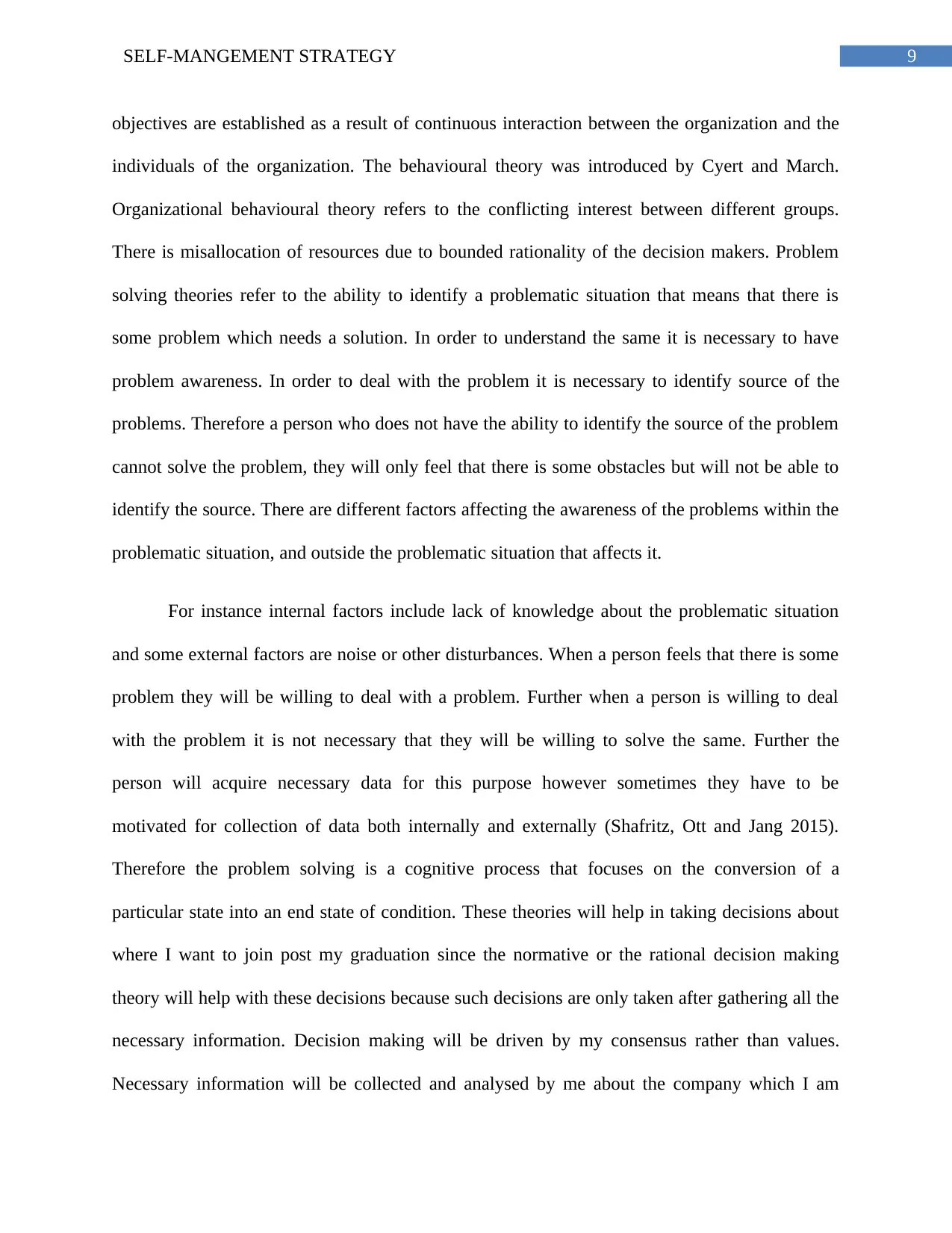
9SELF-MANGEMENT STRATEGY
objectives are established as a result of continuous interaction between the organization and the
individuals of the organization. The behavioural theory was introduced by Cyert and March.
Organizational behavioural theory refers to the conflicting interest between different groups.
There is misallocation of resources due to bounded rationality of the decision makers. Problem
solving theories refer to the ability to identify a problematic situation that means that there is
some problem which needs a solution. In order to understand the same it is necessary to have
problem awareness. In order to deal with the problem it is necessary to identify source of the
problems. Therefore a person who does not have the ability to identify the source of the problem
cannot solve the problem, they will only feel that there is some obstacles but will not be able to
identify the source. There are different factors affecting the awareness of the problems within the
problematic situation, and outside the problematic situation that affects it.
For instance internal factors include lack of knowledge about the problematic situation
and some external factors are noise or other disturbances. When a person feels that there is some
problem they will be willing to deal with a problem. Further when a person is willing to deal
with the problem it is not necessary that they will be willing to solve the same. Further the
person will acquire necessary data for this purpose however sometimes they have to be
motivated for collection of data both internally and externally (Shafritz, Ott and Jang 2015).
Therefore the problem solving is a cognitive process that focuses on the conversion of a
particular state into an end state of condition. These theories will help in taking decisions about
where I want to join post my graduation since the normative or the rational decision making
theory will help with these decisions because such decisions are only taken after gathering all the
necessary information. Decision making will be driven by my consensus rather than values.
Necessary information will be collected and analysed by me about the company which I am
objectives are established as a result of continuous interaction between the organization and the
individuals of the organization. The behavioural theory was introduced by Cyert and March.
Organizational behavioural theory refers to the conflicting interest between different groups.
There is misallocation of resources due to bounded rationality of the decision makers. Problem
solving theories refer to the ability to identify a problematic situation that means that there is
some problem which needs a solution. In order to understand the same it is necessary to have
problem awareness. In order to deal with the problem it is necessary to identify source of the
problems. Therefore a person who does not have the ability to identify the source of the problem
cannot solve the problem, they will only feel that there is some obstacles but will not be able to
identify the source. There are different factors affecting the awareness of the problems within the
problematic situation, and outside the problematic situation that affects it.
For instance internal factors include lack of knowledge about the problematic situation
and some external factors are noise or other disturbances. When a person feels that there is some
problem they will be willing to deal with a problem. Further when a person is willing to deal
with the problem it is not necessary that they will be willing to solve the same. Further the
person will acquire necessary data for this purpose however sometimes they have to be
motivated for collection of data both internally and externally (Shafritz, Ott and Jang 2015).
Therefore the problem solving is a cognitive process that focuses on the conversion of a
particular state into an end state of condition. These theories will help in taking decisions about
where I want to join post my graduation since the normative or the rational decision making
theory will help with these decisions because such decisions are only taken after gathering all the
necessary information. Decision making will be driven by my consensus rather than values.
Necessary information will be collected and analysed by me about the company which I am
Paraphrase This Document
Need a fresh take? Get an instant paraphrase of this document with our AI Paraphraser
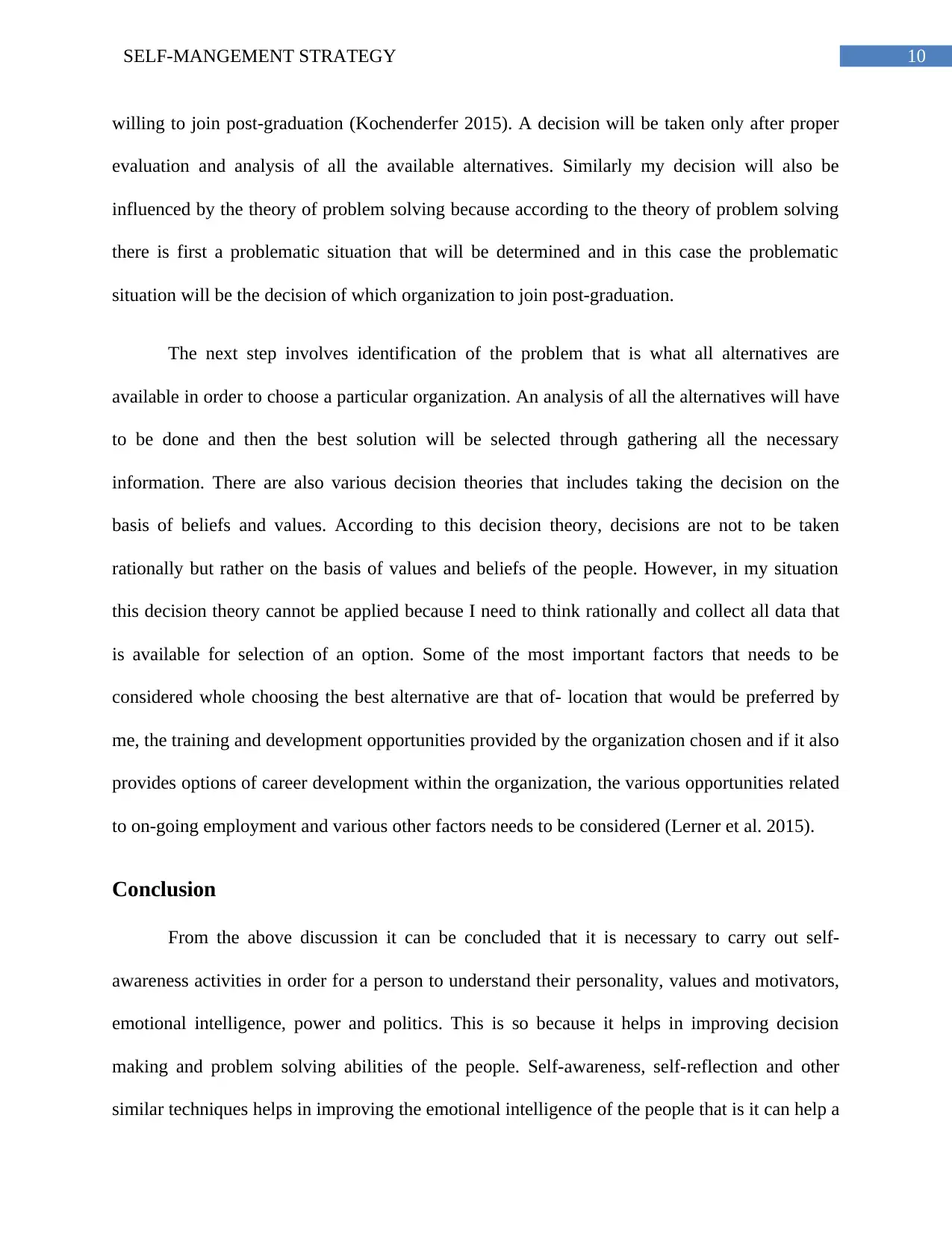
10SELF-MANGEMENT STRATEGY
willing to join post-graduation (Kochenderfer 2015). A decision will be taken only after proper
evaluation and analysis of all the available alternatives. Similarly my decision will also be
influenced by the theory of problem solving because according to the theory of problem solving
there is first a problematic situation that will be determined and in this case the problematic
situation will be the decision of which organization to join post-graduation.
The next step involves identification of the problem that is what all alternatives are
available in order to choose a particular organization. An analysis of all the alternatives will have
to be done and then the best solution will be selected through gathering all the necessary
information. There are also various decision theories that includes taking the decision on the
basis of beliefs and values. According to this decision theory, decisions are not to be taken
rationally but rather on the basis of values and beliefs of the people. However, in my situation
this decision theory cannot be applied because I need to think rationally and collect all data that
is available for selection of an option. Some of the most important factors that needs to be
considered whole choosing the best alternative are that of- location that would be preferred by
me, the training and development opportunities provided by the organization chosen and if it also
provides options of career development within the organization, the various opportunities related
to on-going employment and various other factors needs to be considered (Lerner et al. 2015).
Conclusion
From the above discussion it can be concluded that it is necessary to carry out self-
awareness activities in order for a person to understand their personality, values and motivators,
emotional intelligence, power and politics. This is so because it helps in improving decision
making and problem solving abilities of the people. Self-awareness, self-reflection and other
similar techniques helps in improving the emotional intelligence of the people that is it can help a
willing to join post-graduation (Kochenderfer 2015). A decision will be taken only after proper
evaluation and analysis of all the available alternatives. Similarly my decision will also be
influenced by the theory of problem solving because according to the theory of problem solving
there is first a problematic situation that will be determined and in this case the problematic
situation will be the decision of which organization to join post-graduation.
The next step involves identification of the problem that is what all alternatives are
available in order to choose a particular organization. An analysis of all the alternatives will have
to be done and then the best solution will be selected through gathering all the necessary
information. There are also various decision theories that includes taking the decision on the
basis of beliefs and values. According to this decision theory, decisions are not to be taken
rationally but rather on the basis of values and beliefs of the people. However, in my situation
this decision theory cannot be applied because I need to think rationally and collect all data that
is available for selection of an option. Some of the most important factors that needs to be
considered whole choosing the best alternative are that of- location that would be preferred by
me, the training and development opportunities provided by the organization chosen and if it also
provides options of career development within the organization, the various opportunities related
to on-going employment and various other factors needs to be considered (Lerner et al. 2015).
Conclusion
From the above discussion it can be concluded that it is necessary to carry out self-
awareness activities in order for a person to understand their personality, values and motivators,
emotional intelligence, power and politics. This is so because it helps in improving decision
making and problem solving abilities of the people. Self-awareness, self-reflection and other
similar techniques helps in improving the emotional intelligence of the people that is it can help a
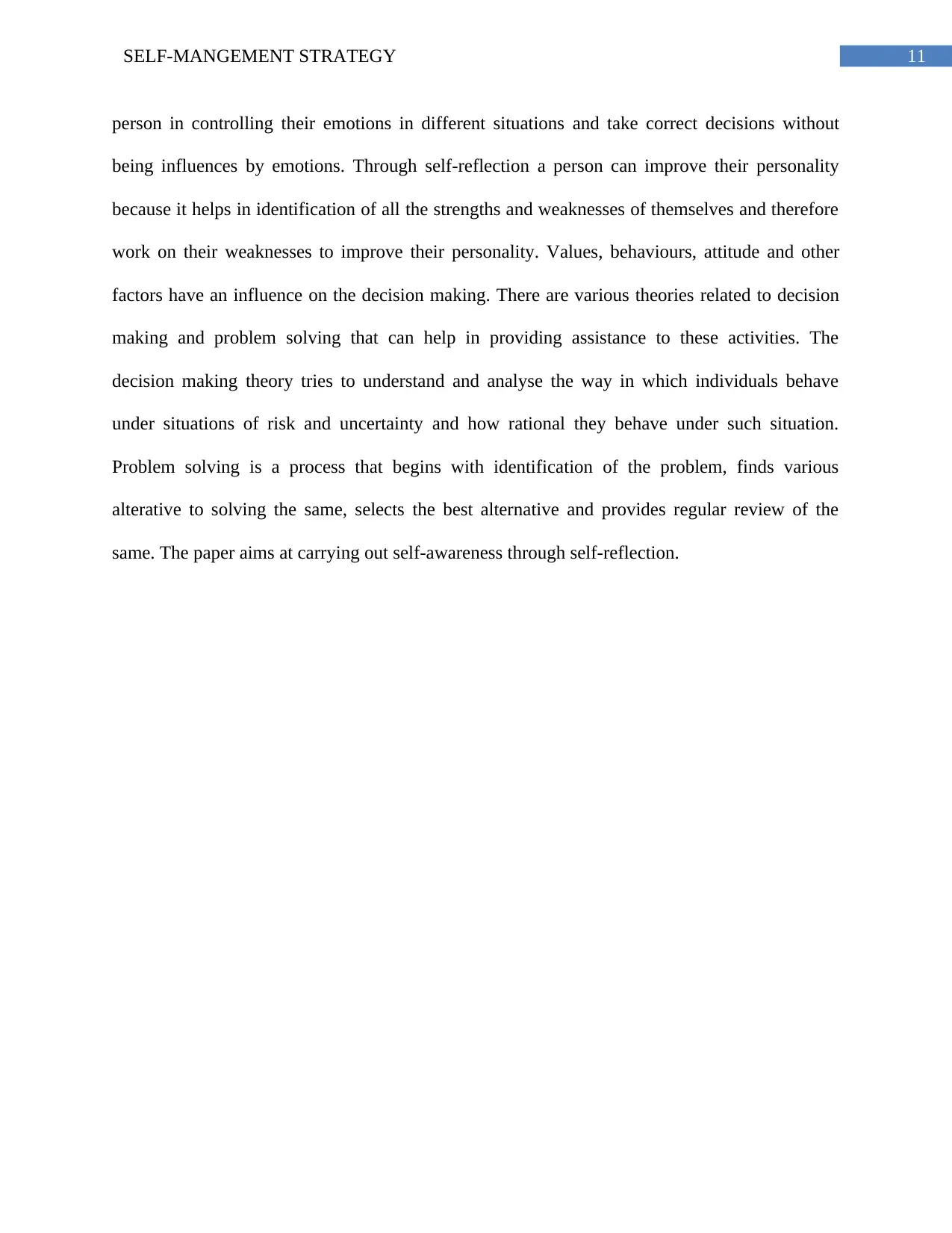
11SELF-MANGEMENT STRATEGY
person in controlling their emotions in different situations and take correct decisions without
being influences by emotions. Through self-reflection a person can improve their personality
because it helps in identification of all the strengths and weaknesses of themselves and therefore
work on their weaknesses to improve their personality. Values, behaviours, attitude and other
factors have an influence on the decision making. There are various theories related to decision
making and problem solving that can help in providing assistance to these activities. The
decision making theory tries to understand and analyse the way in which individuals behave
under situations of risk and uncertainty and how rational they behave under such situation.
Problem solving is a process that begins with identification of the problem, finds various
alterative to solving the same, selects the best alternative and provides regular review of the
same. The paper aims at carrying out self-awareness through self-reflection.
person in controlling their emotions in different situations and take correct decisions without
being influences by emotions. Through self-reflection a person can improve their personality
because it helps in identification of all the strengths and weaknesses of themselves and therefore
work on their weaknesses to improve their personality. Values, behaviours, attitude and other
factors have an influence on the decision making. There are various theories related to decision
making and problem solving that can help in providing assistance to these activities. The
decision making theory tries to understand and analyse the way in which individuals behave
under situations of risk and uncertainty and how rational they behave under such situation.
Problem solving is a process that begins with identification of the problem, finds various
alterative to solving the same, selects the best alternative and provides regular review of the
same. The paper aims at carrying out self-awareness through self-reflection.
⊘ This is a preview!⊘
Do you want full access?
Subscribe today to unlock all pages.

Trusted by 1+ million students worldwide
1 out of 14
Related Documents
Your All-in-One AI-Powered Toolkit for Academic Success.
+13062052269
info@desklib.com
Available 24*7 on WhatsApp / Email
![[object Object]](/_next/static/media/star-bottom.7253800d.svg)
Unlock your academic potential
Copyright © 2020–2026 A2Z Services. All Rights Reserved. Developed and managed by ZUCOL.


